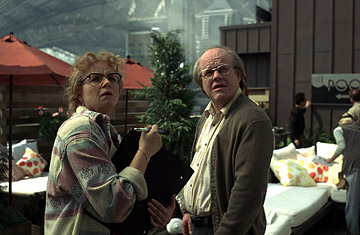
Samantha Morton and Philip Seymour Hoffman in Synecdoche, New York
(2 of 3)
His one great career break — a MacArthur "genius" grant, giving him a few hundred thousand dollars to pursue his theatrical dreams — will slowly break him over the rest of his long, increasingly demented life. Caden moves to Manhattan, rents a warehouse and in it constructs a smaller version of the city outside. Hiring a huge cast, he sets out to assemble an epic of ordinariness. His second wife, Claire (Michelle Williams), will be the star; the ever-loyal Hazel is his assistant. A stalker named Sammy (Tom Noonan) has got the job of portraying Caden. "I've been following you for 20 years," he tells the director. "So cast me and see who you really are."
No masterpiece is the work of a moment, but Caden's theater piece is a long time coming — decades long, as the performers sink into their roles, live in the warehouse, blur the boundary between acting and living. Caden and Hazel are nearing old age by the time a celebrated actress, Millicent Weems (Dianne Wiest), joins the ensemble, also playing Caden, who is now seen in women's clothes and hair, looking strangely Millicentish. He also gives Hazel a doppelganger (Emily Watson), who's also a magnet for his desperate sexual itch. But none of this gets Caden closer to realizing his project, or even naming it. (One title he toys with: Infectious Diseases in Cattle.) Ensuring his despair are occasional glimpses of his now-grown Olive. First she is a sex-club dancer, nude and tattooed. Later he visits Olive on her hospital deathbed. He stares at the rose that is tattooed on her arm, and sees a real petal fall off.
Synecdoche, as you'll remember from seventh grade grammar class, is a figure of speech substituting the part for the whole (using "hands" for "sailors" in "all hands on deck"). Caden's parts, you could say, are irrevocably crumbling into a black hole of depression. Some of the movie's parts may stir confusion in the viewer, but the whole is clear: Caden is losing his spirit, his determination and his mind.
The obvious inspiration is Federico Fellini's 8-1/2, in which Guido, a moviemaker with a director's block, is beset by memories and fantasies as he dodges all the women in his life, from mother to wife to whore to mistress to muse. Caden has women problems (wife, daughter, mistress, actress); but Synecdoche, bless it, doesn't demean or dismiss any of them — except maybe the family shrink (Hope Davis), who tells Caden her new best-selling book can help him, then charges him $45 for a copy. And this artist's problem is not the lack of an idea but his fidelity to it as it grows and grows and splits its seams. It has become a child he can't control, the alien seed he spawned. Any creative person, indeed anyone who has launched some grand project (renovating a home, planting a garden, starting a business), must be familiar with this dread: that the creation has taken on its own life, that it will overwhelm and consume its creator, that the work will never be finished. Caden couldn't bring his magnificent idea to fruition. Kaufman did.
